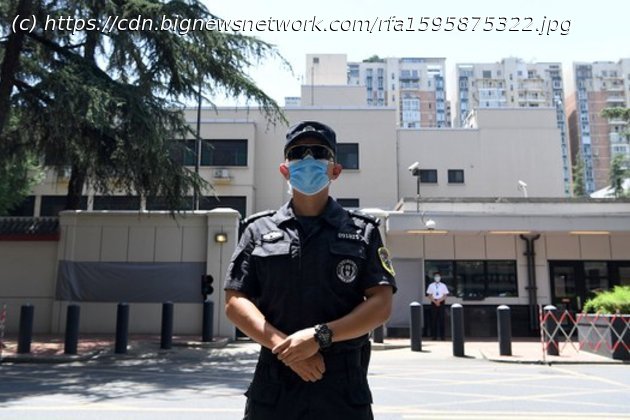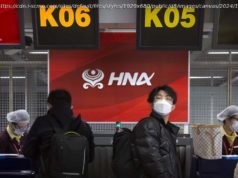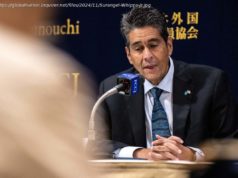Authorities in the southwestern Chinese city of Chengdu on Monday escorted anti-US protesters away from the former US consulate in the city
Authorities in the southwestern Chinese city of Chengdu on Monday escorted anti-U. S. protesters away from the former U. S. consulate in the city, as the American flag was hauled down and staff left the premises after Beijing ordered the facility to close. One man shouted: “Long live the Chinese people! Long live the Communist Party of China!” before being led away by special police officers. Another wore a shirt that read “SLING OUT USA!” in English, while officers removed a bouquet of flowers left outside the gates. Security was tight in the streets around the building on Monday, with police cordoning off a wide area and preventing media organizations from approaching the area. Foreign ministry spokesman Wang Wenbin said the closure of the consulate, which came after the Chinese consulate in Houston was given three days to evacuate amid allegations of spying, was a “legitimate and necessary response to the unreasonable act.” “We urge the U. S. to immediately correct its mistakes and create necessary conditions for the relationship between the two countries to return to the normal track,” Wang said. After the building was vacated by staff and logistics companies, workers covered up the signs and a bronze plaque near the entrance. Passers-by posed for selfies and waved Chinese flags outside the former consulate once the cordon was lifted. The Chengdu consulate made headlines around the world in 2012, after former Chongqing police chief Wang Lijun fled there in an unsuccessful asylum claim that brought down Chongqing ruling Chinese Communist Party secretary Bo Xilai in the biggest political scandal in decades. Spying allegations The order to close the Chinese consulate in Houston last week came amid allegations from the administration of U. S. President Donald Trump that the facility was a hub for espionage activities in Texas, which had targeted the Texas A&M medical system and the University of Texas MD Anderson Cancer Center in Houston. China has denied the allegations, but later made similar claims about the activities of U. S. personnel based in Chengdu. The U. S. State Department said the consulate “has stood at the center of our relations with the people in Western China, including Tibet, for 35 years.” “We are disappointed by the Chinese Communist Party’s decision and will strive to continue our outreach to the people in this important region through our other posts in China,” it said in a statement on the closure. China’s foreign ministry said U. S. diplomats had closed the consulate at 10 a.m., as ordered. Sophie Richardson, China director at the New York-based group Human Rights Watch (HRW), said the deteriorating bilateral relationship would seriously impact the flow of reliable information coming out of Tibet and Xinjiang about human rights abuses in those areas.






